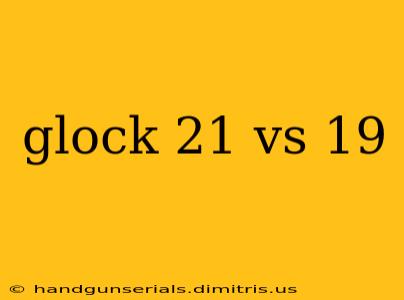Choosing the right handgun is a deeply personal decision, influenced by factors like intended use, hand size, and personal preference. For many, the debate boils down to the Glock 21 and the Glock 19 – two popular models with distinct characteristics. This in-depth comparison will analyze their key features to help you make an informed choice.
Caliber and Capacity: The Core Difference
The most significant difference lies in caliber and resulting magazine capacity. The Glock 21 fires the powerful and widely available .45 ACP round, while the Glock 19 utilizes the ubiquitous 9x19mm Parabellum (9mm).
-
.45 ACP: Known for its stopping power, the .45 ACP delivers substantial energy transfer upon impact. This makes it a favored choice for home defense and situations requiring immediate incapacitation. However, recoil is noticeably stronger, leading to potentially slower follow-up shots for less experienced shooters. The Glock 21 typically holds 13 rounds in its standard magazine.
-
9mm: The 9mm offers a balance between stopping power and manageable recoil. Its lighter recoil allows for faster target acquisition and more rapid follow-up shots, making it a popular choice for both concealed carry and law enforcement. The Glock 19 generally holds 15 rounds in its standard magazine, offering higher capacity than the Glock 21.
Table Summarizing Caliber and Capacity:
| Feature | Glock 21 | Glock 19 |
|---|---|---|
| Caliber | .45 ACP | 9mm Parabellum |
| Standard Capacity | 13 rounds | 15 rounds |
Size and Weight: Concealed Carry Considerations
Size and weight are crucial factors, especially for concealed carry.
-
Glock 21: The larger frame and heavier weight of the Glock 21 make it less ideal for everyday concealed carry. While manageable for some, it can be cumbersome and uncomfortable for extended periods. It's better suited for home defense or open carry situations.
-
Glock 19: The Glock 19's compact size and lighter weight make it a popular choice for concealed carry. Its slimmer profile allows for easier concealment under clothing, offering greater comfort and maneuverability.
Table Summarizing Size and Weight (Approximate):
| Feature | Glock 21 | Glock 19 |
|---|---|---|
| Size | Larger | Compact |
| Weight | Heavier | Lighter |
| Concealability | Less Ideal | More Ideal |
Recoil and Shootability: Impact on Accuracy
Recoil management significantly impacts accuracy and follow-up shot speed.
-
Glock 21: The .45 ACP's heavier recoil can be challenging for less experienced shooters, potentially affecting accuracy. However, experienced shooters might find the recoil manageable, particularly with proper shooting techniques.
-
Glock 19: The 9mm's lighter recoil contributes to greater accuracy and faster follow-up shots, making it easier to control and shoot effectively, especially during rapid fire.
Ergonomics and Features: User Experience
Both pistols share Glock's renowned reliability and simple design, but subtle differences exist.
-
Glock 21: Its larger grip might be more comfortable for those with larger hands, providing a better hold and control.
-
Glock 19: Its more compact grip might be better suited for those with smaller hands, while still offering sufficient control. Both pistols feature Glock's safe action system, a trigger safety mechanism that requires the trigger to be pulled fully for the pistol to fire.
Conclusion: The Right Choice Depends on Your Needs
Ultimately, the best choice between the Glock 21 and Glock 19 depends on your individual needs and priorities. The Glock 21 excels in stopping power and is a formidable home defense weapon, while the Glock 19 offers superior concealability and is a better choice for everyday carry. Consider your experience level, intended use, and physical attributes before making your decision. Always practice safe gun handling and seek professional instruction if you are a new firearm owner.

